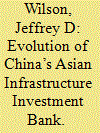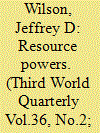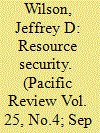|
|
|
Sort Order |
|
|
|
Items / Page
|
|
|
|
|
|
|
| Srl | Item |
| 1 |
ID:
136950


|
|
|
|
|
| Summary/Abstract |
The special issue this article opens engages with an apparent conundrum that has often puzzled observers of East Asian politics—why, despite the region's considerable economic integration, multilateral economic governance institutions remain largely underdeveloped. The authors argue that this ‘regionalism problématique’ has led to the neglect of prior and more important questions pertaining to how patterns of economic governance, beyond the national scale, are emerging in East Asia and why. In this special issue, the contributors shift analytic focus onto social and political struggles over the scale and instruments of economic governance in East Asia. The contributions identify and explain the emergence of a wide variety of regional modes of economic governance often neglected by the scholarship or erroneously viewed as stepping stones towards ‘deeper’ multilateralism.
|
|
|
|
|
|
|
|
|
|
|
|
|
|
|
|
| 2 |
ID:
168231


|
|
|
|
|
| Summary/Abstract |
China’s Asian Infrastructure Investment Bank (AIIB) is a controversial addition to both the global and Asian economic architectures. Western critics have alleged it is a vehicle designed to achieve China’s geostrategic goals, while scholars have argued it marks China’s adoption of a ‘revisionist’ foreign policy strategy. This article argues that such interpretations are incorrect, as they fail to account for the evolution of China’s AIIB agenda. To secure a broad membership and international legitimacy for the AIIB, China compromised with partners during governance negotiations in 2015. Western country demands saw several controversial initial proposals dropped, the governance practices of existing multilateral development banks were adopted, and cooperative partnerships were developed with the World Bank and Asian Development Bank. This transition from a revisionist to status-seeking AIIB agenda reveals the flexibility of Chinese economic statecraft, and its willingness to compromise strategic goals to boost the legitimacy of its international leadership claims.
|
|
|
|
|
|
|
|
|
|
|
|
|
|
|
|
| 3 |
ID:
155096


|
|
|
|
|
| Summary/Abstract |
Of the recent transformations in the political economy of the Asia-Pacific, one of the most dramatic has been to the region's trade architecture. For many years, Asian government were committed trade multilateralists: pursuing liberalisation either globally through the GATT, or regionally via APEC's model of open regionalism. Underpinned by US and Japanese leadership, this system provided the foundation for the export-driven Asian economic miracle. But since the early twenty-first century, the system has been rapidly transformed. The proliferation of preferential trade agreements has threatened to undermine the cohesiveness of regional trade arrangements. The emergence of WTO-Plus style liberalisation, emphasising services, investment and intellectual property, marks the maturation of a system previously focussed on tariff reduction and manufacturing exports. Since 2011, competition between two ‘mega-regional’ proposals – the Trans-Pacific Partnership and the Regional Comprehensive Economic Partnership – is also indicative of new splits which cut across traditional developmental divides. Growing geopolitical rivalry between the US and China has also raised question of who will lead the next round of liberalisation in the region. Exploring these new trends, this paper argues the trade architecture of the Asia-Pacific is entering is becoming more contested and fragmented, with major implications for economic regionalism in coming years.
|
|
|
|
|
|
|
|
|
|
|
|
|
|
|
|
| 4 |
ID:
136956


|
|
|
|
|
| Summary/Abstract |
In recent years, efforts to institutionalise resource security cooperation in the Asia-Pacific region have intensified. Soaring world prices for minerals and energy have seen a range of resource security strategies launched—through the Association of Southeast Asian Nations (ASEAN), ASEAN Plus Three, Asia-Pacific Economic Cooperation and the East Asia Summit—all of which aim to promote intergovernmental dialogue, policy coordination and the integration of regional resource markets. However, the practical achievements of these regional efforts have been limited, as none have advanced beyond dialogue activities to more formalised types of resource security cooperation. This article examines the dynamics of these abortive attempts to regionalise resource cooperation in the Asia-Pacific, arguing that economic nationalist resource policy preferences held by governments have acted as a major obstacle to cooperation. Through an analysis of national resource policy regimes and the outputs of recent cooperative efforts, it demonstrates how economic nationalism has encouraged inward-looking and sovereignty-conscious actions on the part of major resource players in the Asia-Pacific. As a result, intergovernmental resource cooperation has been limited to informal and voluntary ‘soft-law’ initiatives, which have not made a substantive contribution to the resource security of economies in the region.
|
|
|
|
|
|
|
|
|
|
|
|
|
|
|
|
| 5 |
ID:
160612


|
|
|
|
|
| Summary/Abstract |
The ‘Indo-Pacific’ has emerged as the newest addition to the lexicon of Asian regionalism. Conceived of as the conjunction of the Pacific and Indian Oceans, it reflects the belief that maritime linkages require extending Asian regionalism westwards to include countries on the Indian Ocean rim. It also competes with the longstanding ‘Asia-Pacific’ conceptualisation of the region, and four governments—Australia, India, Japan and the USA—have adopted it into their foreign policies. Much of the debate on the Indo-Pacific focusses on how it institutionally ‘rescales’ Asian regionalism through the incorporation of Indian Ocean states. This article considers the functional rescaling that attends this process: namely, what kind of regionalism is implied by the Indo-Pacific concept? It argues that the Indo-Pacific is a security-focussed regional project, reflecting the desire of its proponents to form a quadrilateral bloc to resist China’s growing maritime assertiveness. This security region is radically different from the Asia-Pacific concept, where regionalism was primarily driven by economic integration and cooperation. The Indo-Pacific thus marks a more contested period in Asia’s international politics, where the functional purpose of regional cooperation is being reoriented from economic- to security-focussed agendas.
|
|
|
|
|
|
|
|
|
|
|
|
|
|
|
|
| 6 |
ID:
104986


|
|
|
|
|
| Publication |
2011.
|
| Summary/Abstract |
Since 2005, a burgeoning wave of Chinese investments has set off a new 'minerals boom' in the Australian iron ore and coal mining sectors. While normally a welcome development, the state-owned and strategic nature of the investors has raised concerns in Australia about how these should be regulated. As a result, in February 2008 the Australian government declared an intention to more closely screen foreign direct investment (FDI) from state-owned sources, which both supporters and detractors alike have claimed is evidence of 'resource nationalism' in Australia's approach towards its trade and investment relationships with China. This article challenges this understanding through an examination of the characteristics of Chinese mining FDI, the dilemmas these present to the Australian government, and the relatively restrained nature of its response. Through this, Australia's FDI policy is explained as a defensive move against the potential for strategic behaviour by Chinese investors resulting from their state ownership, rather than any national program to subject minerals trade and investment to political control. On this basis, the article argues that Australian government policy instead evidences a 'resource liberalism' approach, which intends to ensure that the governance of Australia's minerals trade and investment with China remain market-based processes.
|
|
|
|
|
|
|
|
|
|
|
|
|
|
|
|
| 7 |
ID:
137725


|
|
|
|
|
| Summary/Abstract |
The rise of new economic powers has seen increasing attention focused on the international role of the BRICS countries. Importantly, a common feature uniting the BRICS is that they are all resource-rich, and many analysts (and some BRICS governments) have argued that natural resources are one of the key factors propelling the rise of the group. This article explores the BRICS’ emerging status as ‘resource powers’, examining how resource wealth underpins their economic development and foreign policy strategies, and thus contributes to their growing influence in international affairs. It is argued that through the use of nationalistic mining and energy policies, the BRICS governments have exploited natural resources for both domestic economic and international diplomatic objectives. However, there are several challenges and emerging risks facing the BRICS’ resource strategies, which mean that resource wealth is making a positive – though inherently limited – contribution to the growing international status of the group.
|
|
|
|
|
|
|
|
|
|
|
|
|
|
|
|
| 8 |
ID:
114815


|
|
|
|
|
| Publication |
2012.
|
| Summary/Abstract |
Following a historical commitment to multilateralism, in the last decade the trade policy initiatives of many states in the Asia-Pacific have turned to bilateralism through the negotiation of free trade agreements (FTAs). The corresponding proliferation of regional FTAs has thus far been understood to result from three broad motivations: a desire to advance trade liberalization beyond World Trade Organization (WTO) disciplines; mercantilistic efforts to secure preferential access to key export markets; and/or attempts to use FTAs to secure non-economic political gains. This paper argues that since the middle of the decade a new motive has emerged - the use of FTAs to improve resource security - particularly by import-dependent resource consumers in Northeast Asia. As yet unexamined in the literature, this paper seeks to document and explain this trend. It analyses the recent emergence of resource security concerns as a new FTA motive; the corresponding shifts in the FTA strategies and initiatives of Japan, Korea and China; and the dynamics of an emerging race for resource-related FTAs between the three governments. Based on this analysis, it demonstrates that resource-related FTAs could potentially improve consumers' resource security through either the liberalization of trade, the extension of investment protections or broader diplomatic gains with the targeted supplier. However, owing to supplier reluctance to enter into binding policy commitments for resource industries, their track record shows success in only the diplomatic dimension, and the prospects for a strengthening of their effects are poor. As a result, it is argued that while resource concerns have become a key motive for FTA initiatives in the Asia-Pacific region, they have not substantively improved resource security for its import-dependent states and are unlikely to do so in the future.
|
|
|
|
|
|
|
|
|
|
|
|
|
|
|
|
| 9 |
ID:
136951


|
|
|
|
|
| Summary/Abstract |
In the early years of the twenty-first century, Asian regionalism is at a crossroads. While the region is home to a broad array of multilateral organisations, the record of these bodies in fostering effective and legitimate cooperation has been decidedly weak. Drawing on insights from the work of David Mitrany on international cooperation, this article contends that the key problem facing Asian regionalism is a predilection for ‘top-down’ rather than ‘bottom-up’ regionalism strategies. These top-down strategies have involved efforts to find a single institutional design for regional cooperation (similar to the experience of Europe), which has been hindered by geopolitical rivalries and a lack of shared consensus around what constitutes the ‘Asian region’. By considering the contours of interstate competition in Asia, the track record of its existing regionalism efforts and insights from comparative regional studies, it is instead argued that Asia's future is one of regions rather than a single region. As Mitrany suggests, the unique geopolitical context in Asia means that functionally discrete and variegated strategies are likely to provide a more effective basis for regional cooperation. Indeed, trends towards such a functional approach to regionalism are already becoming evident in Asia today.
|
|
|
|
|
|
|
|
|
|
|
|
|
|
|
|
| 10 |
ID:
161511


|
|
|
|
|
| Summary/Abstract |
In 2008, rare earth minerals (REMs) shot to the top of the international agenda. When China began restricting exports of these critical materials, many claimed it was threatening a “REMs weapon” against the US and Japan. Yet by 2014, the crisis had quickly abated, as China shelved its policies in the face of pressure from consumer governments. This article examines why REMs emerged – and then quickly disappeared – as a threat to international security in Asia. It first conceptualizes the geopolitics of critical materials, before analyzing the politics of the REMs crisis between Japan, China, and the US. It argues that China’s ability to use REMs for diplomatic coercion was inherently weak and is unlikely to pose a similar threat to international security in future years.
|
|
|
|
|
|
|
|
|
|
|
|
|
|
|
|
|
|
|
|
|